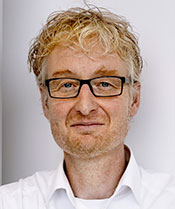Industry Leaders in Signal Processing and Machine Learning: Max Welling

 Dr. Max Welling is a research chair in Machine Learning at the University of Amsterdam and a Distinguished Scientist at Microsoft Research (MSR). He is a fellow at the Canadian Institute for Advanced Research (CIFAR) and the European Lab for Learning and Intelligent Systems (ELLIS) where he also serves on the founding board. His previous appointments include VP at Qualcomm Technologies, professor at UC Irvine, postdoc at U. Toronto and UCL under supervision of prof. Geoffrey Hinton, and postdoc at Caltech under supervision of prof. Pietro Perona. He finished his PhD in theoretical high energy physics under supervision of Nobel laureate prof. Gerard ‘t Hooft.
Dr. Max Welling is a research chair in Machine Learning at the University of Amsterdam and a Distinguished Scientist at Microsoft Research (MSR). He is a fellow at the Canadian Institute for Advanced Research (CIFAR) and the European Lab for Learning and Intelligent Systems (ELLIS) where he also serves on the founding board. His previous appointments include VP at Qualcomm Technologies, professor at UC Irvine, postdoc at U. Toronto and UCL under supervision of prof. Geoffrey Hinton, and postdoc at Caltech under supervision of prof. Pietro Perona. He finished his PhD in theoretical high energy physics under supervision of Nobel laureate prof. Gerard ‘t Hooft.
Max Welling has served as associate editor in chief of IEEE TPAMI from 2011-2015, he serves on the advisory board of the Neurips foundation since 2015 and has been program chair and general chair of Neurips in 2013 and 2014 respectively. He was also program chair of AISTATS in 2009 and ECCV in 2016 and general chair of MIDL 2018. Max Welling is recipient of the ECCV Koenderink Prize in 2010 and the ICML Test of Time award in 2021. He directs the Amsterdam Machine Learning Lab (AMLAB) and co-directs the Qualcomm-UvA deep learning lab (QUVA) and the Bosch-UvA Deep Learning lab (DELTA).
We approached Max Welling with a few questions:
1. What challenges have you had to face to get to where you are today?
Not very many in fact, apart from hard work. I recall developing “Repetitive Stress Injury” syndrome due to coding and using the mouse too much. I had my usual batch of paper rejections, especially in the beginning when I had no idea what it took in the ML community to get a paper published and I felt all upset when Neurips (then NIPS) refused to take my paper on an EM algorithm for ICA! Switching fields is of course also not always easy. For a long time, I didn’t care about writing really impactful papers; I just did what I liked to do. In hindsight this has hurt my h-index a little bit (if that is something one should care about in the first place). I only later learnt how to pick topics that would really make a meaningful impact.
2. What was the most important factor in your success?
I feel incredibly privileged in that I seemed to have made the right choices at the right times. For instances, I decided to switch from theoretical physics to computer vision and machine learning after my PhD, which clearly was the right thing to do in hindsight. I have always had the fortune of working with incredibly talented students, both in Irvine as well as in Amsterdam who have clearly made an important contribution to my success. And of course, I had the good fortune to work with the best people in the field: in physics with a Nobel Laureate Gerard ‘t Hooft and in machine learning with stars like Pietro Perona and Geoffrey Hinton from whom I really learnt a lot. Finally, I guess one of the most important factors was agility in research. I was used to switching topics, and when deep learning came along I wasn’t stuck in my own research and was able to make the switch quickly. That switch has done a lot of good for my career.
3. How does your work affect society?
I would say the impact was only rather indirect until a few years ago. I think Variational Autoencoders, Graph NNs and Equivariance are used a lot in applications so that I would call indirect impact. Then I started to work for Qualcomm on topics in wireless communication and clearly this corporate R&D finds its way more quickly to products. I also worked on speeding up MRI imaging, but I am not aware of a direct transfer to industry that may have come from that. On the first of September I started my new job at MSR where I will be working on molecular simulation with applications in sustainable technology that can help fight climate change. So, in the second “half” of my career I hope to make more tangible positive impact for society.
4. If there is one take home message you would want the readers of this interview to take away, what would that be?
Develop a long-term vision for what you want to work on and avoid short term incremental research. Be inspired by big questions and do not be afraid to talk about what excites you. Work on things that you think are important, not on things other people find important, in other words, decorrelate yourself from others and think for yourself. Make a positive impact on the world, we need it more than ever.
5. Failures are an inevitable part of everyone’s career journey. What is the most important lesson you have learned during your career when dealing with failures?
Know when to stop. You can shelve an idea and it will come back to you in some other form or shape. But don’t keep pushing just for the sake of not wanting to let go. Also, listen to your students: never tell them they are wrong or discourage them to follow their ideas. They bring new fresh ideas to a lab, and often they are right! It’s OK to get a paper rejected, or a grant rejected. Don’t be discouraged and move on with what you believe in. Grow a thick skin for “Reviewer 2”’s nasty comments to your research. Good research will be noticed eventually.
6. Although novelty and innovation is the most important factor for technology advancement, yet when a researcher, scientist or engineer has a new idea there are a lot of push backs until they prove that the new idea actually works. What is your advice on how to handle them? Especially for the readers who are in the early stages of their career.
I agree this is a problem in our community. Reviewers are often inexperienced and do not value innovation as much as they should. We are too focused on bold numbers in tables. But, these days we have Arxiv! So go ahead and publish on Arxiv and talk about your work. And write a nicely illustrated blog to explain what you did. Keep improving and resubmitting your paper until it gets in. I had my best papers rejected a few times and through iterative improvement one of them received a best paper in the next iteration! Don’t lose the joy in doing research. Sometimes it helps to collaborate with well-established labs who have the right infrastructure to get large scale experiments performed and understand how to get paper published.
7. Is there anything else you would like to add?
As a community we are facing several challenges around encouraging diversity and making sure our work is beneficial for society. Also, there is still a big task ahead of us to democratize our field to all parts of the world and we should all do our part to help developing countries to catch up. And finally, climate change may be the challenge of the century. My hope is that ML will help develop the technology to fight it.
To learn more about Max Welling and for more information, visit his webpage.

